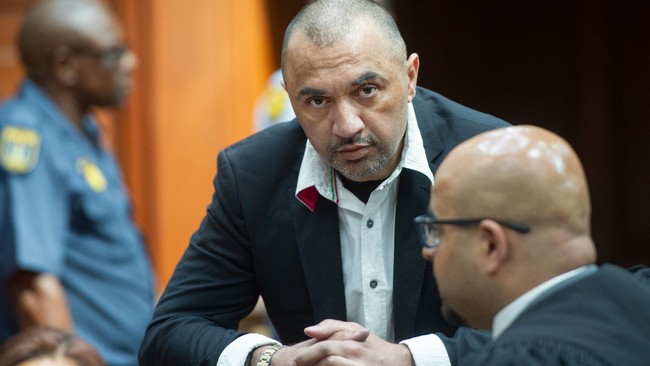Alleged underworld figure Nafiz Modack has denied claims that he instructed co-accused Zane Kilian to track the movements of slain top police officer Charl Kinnear.
Modack, Kilian, and 13 others face a combined 122 charges, including Kinnear’s murder, as part of a sprawling case involving alleged underworld activities.
Kinnear, a highly regarded detective investigating Modack and his operations, was assassinated outside his Bishop Lavis home in September 2020.
Kilian’s Alleged Role in Tracking Kinnear
Zane Kilian is accused of using a cellphone tracking application to locate Kinnear’s whereabouts prior to the murder. The prosecution alleges that Kilian carried out this surveillance under Modack’s instructions.
However, during cross-examination in court this week, Modack’s lawyer, Bashier Sibda, asserted that his client did not instruct Kilian to track the detective. Sibda challenged the prosecution’s narrative, suggesting that the evidence linking Modack to the crime may not be as clear-cut as presented.
Evidence Under Scrutiny
The State’s case includes cellphone data retrieved from Kilian’s device, showing communications with multiple numbers saved under Modack’s name on WhatsApp. This evidence is a key component of the prosecution’s argument that Kilian acted on Modack’s behalf.
Sibda, however, raised doubts about the validity of the State’s claims, arguing that the numbers saved under Modack’s name could have belonged to someone else. “It is possible that anyone using Modack’s name could have communicated with Kilian,” Sibda told the court.
The defense team aims to challenge the reliability of this evidence further, casting doubt on whether Modack had direct involvement in the tracking operation.
Payments in Question
Another contentious point raised in the trial is the flow of payments allegedly made to Kilian from a business account purportedly linked to Modack. The prosecution argues that these transactions are evidence of a financial relationship between the two, potentially tied to the surveillance and subsequent murder of Kinnear.
Sibda is expected to delve deeper into the financial records during ongoing cross-examinations to establish whether these payments can definitively be connected to Modack. The defense has hinted that the transactions may have been for legitimate purposes unrelated to any criminal activity.
The Murder of Charl Kinnear
Charl Kinnear’s murder sent shockwaves through South Africa, highlighting the dangers faced by law enforcement officers investigating organized crime. Kinnear was part of the Anti-Gang Unit and was actively probing Modack’s alleged underworld dealings at the time of his assassination.
The case has drawn significant public and media attention, given the high-profile nature of the accused and the broader implications for law enforcement’s ability to combat organized crime.
Prosecution’s Strategy
The prosecution is building its case around the alleged connections between Modack, Kilian, and other co-accused. The State aims to prove that Modack orchestrated a coordinated effort to eliminate Kinnear, relying on Kilian’s expertise in cellphone tracking to carry out the plan.
Kilian, however, has maintained his innocence, asserting that his actions were unrelated to the murder plot. The defense team has also questioned the credibility of the evidence presented by the prosecution, suggesting it may not conclusively link Modack to the crime.
What’s Next in the Trial
The cross-examination of Zane Kilian is set to continue, with Sibda expected to address key issues, including the payments and the cellphone data. The defense is focused on undermining the State’s argument that Modack was directly involved in Kinnear’s murder.
As the trial unfolds, it remains to be seen how the court will interpret the evidence and whether the defense can create enough reasonable doubt to weaken the prosecution’s case.
With public interest high and the stakes significant, the outcome of the trial could have far-reaching implications for South Africa’s ongoing battle against organized crime.

